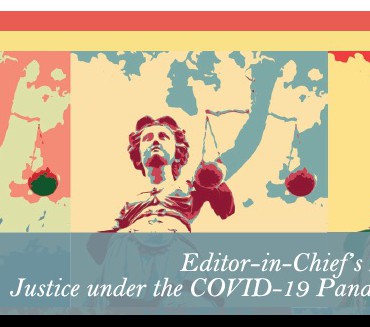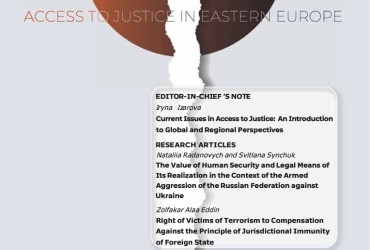The 2020 COVID-19 pandemic has touched all mankind. Our health is put at risk and our everyday lives have been transformed. Many social institutions no longer function effectively in the new reality of the measures governments have taken and the lockdowns ordered in an attempt to halt or at least mitigate the danger. The efforts of authorities and researchers all over the world are directed at the creation of approaches to deal with the new reality and the issues it raises. These efforts include the development of special adaptive regimes that will ensure the possibility of effectively performing everyday social functions now and, if needed, in the future.
Access to justice is an integral element of a rule-of-law democratic state, a common value of human civilization, the effective implementation of which symbolizes the high level of our social evolution. In the context of the rapid spread of the coronavirus, the hospitalizations and lockdowns, the public health measures such as mask-wearing and social distancing, the duty to administer justice properly and in a timely manner has become a difficult task. The general lack of preparedness by legislative and judicial institutions beforehand, and the seemingly ad hoc approaches and development of actions in response to the pandemic have led to outcomes the meaning and consequences of which we will be contemplating and evaluating for a long time.
This special double issue of our journal is symbolic. The arrival of COVID-19 in the early months of this year has had an impact on all spheres of our lives, including scientific and publishing activities. The disruption of plans and schedules, and, most importantly, the changes in our perceptions and feelings about the reality around us which the pandemic has brought with it, have affected us directly, too.
The preparation of a special issue devoted to access to justice in Eastern Europe amid the challenges brought about by the pandemic is an attempt to attract attention and intensify research in this subject area. In this way, we join scholars all over the world who are contributing to similar studies. In particular, we should note the ELI Principles for the COVID-19 Crisis, the special issue ‘Civil Justice and COVID-19, edited by Bart Krans and Anna Nyland, and the joint project of the UNDP, WHO and others ‘COVID-19 Law Lab The challenges of access to justice which are directly related to the pandemic should be analyzed and include dealing with, in particular, organizing the work of the judiciary, administering justice and changing approaches to the methods of resolving disputes, even if the results can only be interim at best. By dedicating this special issue of our journal to the topic of Justice under the COVID-19 Pandemic we want to emphasize the need to unite efforts in order to draw lessons from the experience.
With this in mind, we include notes as well as articles in this special issue. ‘Notes’ comprises contributions in AJEE that give a brief introduction to the topic, in this special issue the challenges COVID-19 raises for certain jurisdictions. Here, academics and practitioners may share the interim results of their research, which is something that will be helpful for other ongoing studies and contribute to the common efforts against the negative consequences of COVID-19, as well as invite reviewer feedback.
Among such notes we have an excellent contribution by Elisabetta Silvestri which presents an overview of the solutions devised by the Italian authorities to handle civil disputes in the time of COVID-19, in particular, concerning the deadlines and hearings in civil cases.
The Lithuanian experience shows us a different approach taken amid the pandemic – in Lithuania there has been no special legislation for court proceedings in response to COVID-19. In Vigita Vebraite’s note, she describes the most important effects of the pandemic on court proceedings and discusses the lessons that could be learned from the situation.
The Polish strategy towards the administration of justice during the COVID-19 pandemic is similarly controversial, perhaps problematical; but that is for the determination of the reader, who is invited to read attentively the note by Bartosz Szolc-Nartowski.
The note, written by Costas Popotas, is based on his presentation given at the online conference ‘The COVID-19 crisis – Lessons for the Courts’, organized by EGPA Permanent Study Group XVIII ‘Justice and Court Administration’4. The positive experience of the Court of Justice of the EU is highly demanded and is worse deep studying and sharing even outside of the Union.
The Ukrainian experience of justice under COVID-19 is presented in four articles, with the general focus on the organization and functioning of the judiciary, and special attention to its financing, as well as peculiarities in relation to consideration of civil and criminal matters.
The first of these articles written by Serhii Prilutskyi and Olga Strieltsova describes the main challenges that the Ukrainian judiciary faces this century and especially those amid the pandemic. The state of affairs seems to be the logical consequence of deeply systemic problems that have accompanied the evolution of the judiciary in Ukraine since it became an independent state, at that time and still today significantly influenced Ukrainian judiciary faces – from the onset of military actions in the east of Ukraine to the COVID-19 outbreak. The pandemic shows how vulnerable the judiciary is. One path forward is to find a new vision and a new understanding of the judiciary in order to ensure its normal functioning, as well as to ensure accessible and effective justice, perhaps partly through lessons learned in the experience with the pandemic.
One of the most difficult steps taken in Ukraine during the pandemic has been the provision of normal funding for the work of government agencies, including the judiciary. In the article by Tetiana Korotenko and Iryna Kondratova a study of existing approaches to the financing of the judiciary in Ukraine is undertaken, in particular an assessment is made of the measure as a result of which the salary of judges was reduced during the lockdown. Using the example of a complex court case which passed all judicial instances in the state as well as studies of the main approaches that were implemented in independent Ukraine, the authors offer conclusions about the possibility of the financial autonomy of the judiciary.
Traditionally in Ukraine, procedural timeframes have been established by law or decided by judges with the aim of having a fair and timely trial and establishing equal access to justice for both parties. Today, new legislative COVID-19 regulations break with this approach and create a new vision of trial timeframes. In his article, Oleh Rozhnov explores the determination of timeliness in the consideration and resolution of civil cases under the conditions of a lockdown in response to the pandemic. In particular, the author criticizes the adoption by the legislator of measures for the automatic extension of procedural deadlines as those that violate the basic principles of civil proceedings and the right of a person to a quick and fair trial.
The most important issues of access to justice and fundamental rights in criminal matters are offered in the article by Oksana Kaplina and Svitlana Sharenko. Some significant remarks are made in their study concerning the derogation of the European Convention and the various measures intended to help maneuver through, as well as successfully deal with the main challenges to the judiciary in matters of criminal law under the conditions of the COVID-19 pandemic in Ukraine.
We wish to thank all the co-authors of this special double issue of our journal for their contributions to the worldwide efforts of scholars researching the impact of COVID-19 in various areas of legal science. Let us hope that this joint endeavor is successful in helping all of us through these challenging times and making us more the wiser!
Chief-Editor
Dr. Iryna Izarova,
Professor of Department, Institute of Law,
Taras Shevchenko National University of Kyiv, Ukraine
TABLE OF CONTENTS
Editor-in-Chief’s Note
About Special Double Issue 2-3/2020
‘Justice under the COVID-19 Pandemic’
Articles
Prylutskyi Serhii, Strieltsova Olga
The Ukrainian Judiciary under 21st-Century Challenges
Rozhnov Oleh
Towards Timely Justice in Civil Matters Amid the COVID-19 Pandemic
Kaplina Oksana, Sharenko Svitlana
Access to Justice in Ukrainian Criminal Proceedings during COVID-19 Outbreak
Kondratova Iryna, Korotenko Tetiana
Towards Modern Challenges in Financing in the Judiciary Financing: Between Independence and Autonomy
Notes
Silvestri Elisabetta
Italy and COVID-19: Notes on the Impact of the Pandemic on the Administration of Justice
Vėbraitė Vigita
Impact of the COVID-19 Pandemic on Court Proceedings in Lithuania
Popotas Costas
COVID-19 and the Courts. The case of the CJEU
Szolc-Nartowski Bartosz
Coronavirus and the Justice System in Poland












